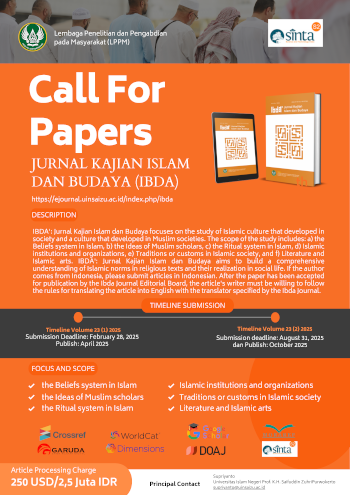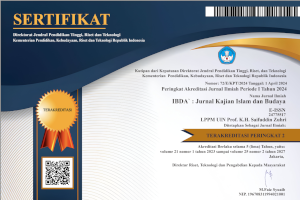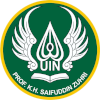The Response of Milenial Muslim Generations to The Tradition of Kungkum Purnama in Banjarpanepen, Banyumas, Indonesia
DOI:
https://doi.org/10.24090/ibda.v19i2.4516Keywords:
Islam Tradition, Muslim millennial generationAbstract
Islam entered the island of Java with the condition that the people already have traditions. One of the traditions that still exist today is Kungkum Purnama in Kalicawang, Banjarpanepen Sumpiuh Village, Banyumas District. The Kungkum Purnama tradition is carried out every year in the month of Sha’ban as a form of welcoming the month of Ramadan for Muslims. The implementation of the Kungkum Purnama tradition is followed by village communities who are not only Muslim, but also those who are non-Muslim or religious. It cannot be denied that the Muslim millennial generation is one of the heirs to tradition. This study aims to describe the response of the Muslim millennial generation to the kungkum purnama tradition. In practice, researchers used qualitative research methods of field research type. Data were collected by means of observation, interviews and documentation. The analysis was carried out by collecting data, reducing data, presenting data, and drawing conclusions. The results showed that the Kungkum Purnama tradition is a form of acculturation of Islam with Banyumasan culture, which contains social and religious values, namely Islamic syiar, to welcome Ramadan, friendship, and clean oneself. The response of the Muslim millennial generation shows their view of the kungkum purnama tradition. From a religious perspective, the practice of the kungkum purnama tradition on the other hand contains teachings that are contrary to Islamic teachings. From a cultural point of view, the kungkum purnama tradition is a local tradition and a tourist attraction that needs to be preserved. From a social point of view, the kungkum purnama tradition contains the values of cooperation, mutual cooperation, and togethernessDownloads
Download data is not yet available.
References
Abdullah, Taufik. 1991. Sejarah Umat Islam Indonesia. Majelis Ulama Indonesia.
Abdurrahman, Dudung. 2014. Komunitas-Multikulturalisme dalam Sejarah Islam Periode Klasik. Yogyakarta: Penerbit Ombak.
Cahyono, Agus. 2006. “Seni Pertunjukan Arak-Arakan dalam Upacara Tradisional Dugdheran di Kota Semarang.” Harmonia 7, no. 3: 1–11.
Fadli, Subhan. 2019. “Membangun Toleransi Generasi Milenial.” Prosiding Seminar Nasional, Harmonisasi Keberagaman dan Kebangsaan Bagi Generasi Milenial, Lembaga Kajian Keagamaan, Universitas Pamulang, 2019, 120–36.
Faiza, Arum. 2018. Arus Metamorfosa Milenial. Kendal: CV Ahmad Jaya Group.
Fariz, Ahmad. 2020. Biografi 20 Ulama Banyumas. Banyumas: Satria Indra Prasta (SIP) Publishing
Fathurrosi. 2020. “Tradisi Pawai Obor Menyambut Ramadhan dalam Perspektif Komunikasi Lintas Budaya pada Masyarakat Kota Pontianak.” Jurnal Ilmu Komunikasi PROGRESSIO 1, no. 2: 113–31.
Jeane Marie Tulung, Achmad Syahid, Yanice Janis, Yan O Kalampung. 2019. Generasi Milenial. Depok: PT RajaGrafindo Persada.
Margono, S. 2005. Metodologi Penelitian Pendidikan. Jakarta: Rineka Cipta.
Rohman, Kholilur. 2020. Membentuk Generasi Milenial dengan AjaranAjaran NU Yang Berhaluan Aswaja Desa Kertosono. LITBANG PEMAS UNISLA
Said, Muhazzab. 2015. “A Study on the Acculturation of Islam and Local Culture.” Journal of Islamic Civilization in Southeast Asia 4, no. 2: 76–100.
Siregar, Muhammad Andre Syahbana. 2020. “Ziarah Kubur, Marpangir, Mangan Fajar: Tradisi Masyarakat Angkola dan Mandailing Menyambut Bulan Ramadhan dan ‘Idul Fitri.” Warisan: Journal of History and Cultural Heritage 1, no. 1: 9–13.
Sobirin, Mohamad. 2020. “Negotiating Tradition and Innovation Upon the Cross-Generational Art of Singiran (Improvisation, Cultural Identity and Millennial Community).” Teosofia 8, no. 1: 69. https://doi.org/10.21580/tos.v8i1.5300.
Syukur, Abdul. 2018. Tantangan dan Harapan dalam Membangun Masyarakat Islam. Bandung: Madrasah Malem Reboan. http://library1.nida. ac.th/termpaper6/sd/2554/19755.pdf.
Taimiyah, Ibnu. 2001. Etika Beramar Ma’ruf Nahi Mungkar. Jakarta: Gema Insani Press.
Wahid, Abdurrahman. 2006. Islamku, Islam Anda, Islam Kita. Jakarta: Wahid Institute.
Abdurrahman, Dudung. 2014. Komunitas-Multikulturalisme dalam Sejarah Islam Periode Klasik. Yogyakarta: Penerbit Ombak.
Cahyono, Agus. 2006. “Seni Pertunjukan Arak-Arakan dalam Upacara Tradisional Dugdheran di Kota Semarang.” Harmonia 7, no. 3: 1–11.
Fadli, Subhan. 2019. “Membangun Toleransi Generasi Milenial.” Prosiding Seminar Nasional, Harmonisasi Keberagaman dan Kebangsaan Bagi Generasi Milenial, Lembaga Kajian Keagamaan, Universitas Pamulang, 2019, 120–36.
Faiza, Arum. 2018. Arus Metamorfosa Milenial. Kendal: CV Ahmad Jaya Group.
Fariz, Ahmad. 2020. Biografi 20 Ulama Banyumas. Banyumas: Satria Indra Prasta (SIP) Publishing
Fathurrosi. 2020. “Tradisi Pawai Obor Menyambut Ramadhan dalam Perspektif Komunikasi Lintas Budaya pada Masyarakat Kota Pontianak.” Jurnal Ilmu Komunikasi PROGRESSIO 1, no. 2: 113–31.
Jeane Marie Tulung, Achmad Syahid, Yanice Janis, Yan O Kalampung. 2019. Generasi Milenial. Depok: PT RajaGrafindo Persada.
Margono, S. 2005. Metodologi Penelitian Pendidikan. Jakarta: Rineka Cipta.
Rohman, Kholilur. 2020. Membentuk Generasi Milenial dengan AjaranAjaran NU Yang Berhaluan Aswaja Desa Kertosono. LITBANG PEMAS UNISLA
Said, Muhazzab. 2015. “A Study on the Acculturation of Islam and Local Culture.” Journal of Islamic Civilization in Southeast Asia 4, no. 2: 76–100.
Siregar, Muhammad Andre Syahbana. 2020. “Ziarah Kubur, Marpangir, Mangan Fajar: Tradisi Masyarakat Angkola dan Mandailing Menyambut Bulan Ramadhan dan ‘Idul Fitri.” Warisan: Journal of History and Cultural Heritage 1, no. 1: 9–13.
Sobirin, Mohamad. 2020. “Negotiating Tradition and Innovation Upon the Cross-Generational Art of Singiran (Improvisation, Cultural Identity and Millennial Community).” Teosofia 8, no. 1: 69. https://doi.org/10.21580/tos.v8i1.5300.
Syukur, Abdul. 2018. Tantangan dan Harapan dalam Membangun Masyarakat Islam. Bandung: Madrasah Malem Reboan. http://library1.nida. ac.th/termpaper6/sd/2554/19755.pdf.
Taimiyah, Ibnu. 2001. Etika Beramar Ma’ruf Nahi Mungkar. Jakarta: Gema Insani Press.
Wahid, Abdurrahman. 2006. Islamku, Islam Anda, Islam Kita. Jakarta: Wahid Institute.
Downloads
Published
2021-09-30
How to Cite
Saridin, S., Ujianto, A., & Basit, A. (2021). The Response of Milenial Muslim Generations to The Tradition of Kungkum Purnama in Banjarpanepen, Banyumas, Indonesia. IBDA` : Jurnal Kajian Islam Dan Budaya, 19(2), 351–368. https://doi.org/10.24090/ibda.v19i2.4516
Issue
Section
Articles
License
Authors who publish with this journal agree to the following terms:
- Authors retain copyright and grant the journal right of first publication with the work simultaneously licensed under a Creative Commons Attribution-ShareAlike License a that allows others to share the work with an acknowledgement of the work's authorship and initial publication in this journal.
- Authors are able to enter into separate, additional contractual arrangements for the non-exclusive distribution of the journal's published version of the work (e.g., post it to an institutional repository or publish it in a book), with an acknowledgment of its initial publication in this journal.
- Authors are permitted and encouraged to post their work online (e.g., in institutional repositories or on their website) before and during the submission process, as it can lead to productive exchanges, as well as earlier and greater citation of published work (See The Effect of Open Access).















